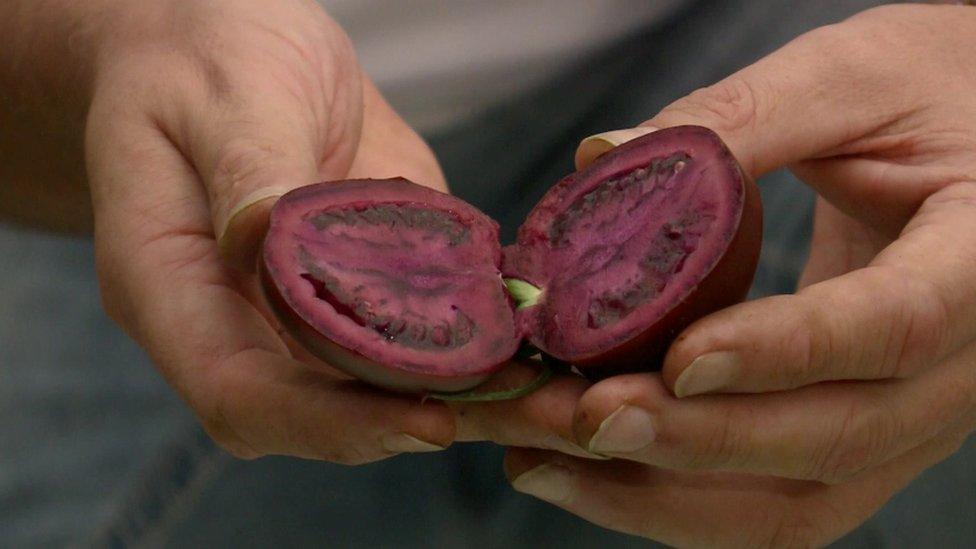GM crops: The Greenpeace activists who risked jail to destroy a field of maize
- Published
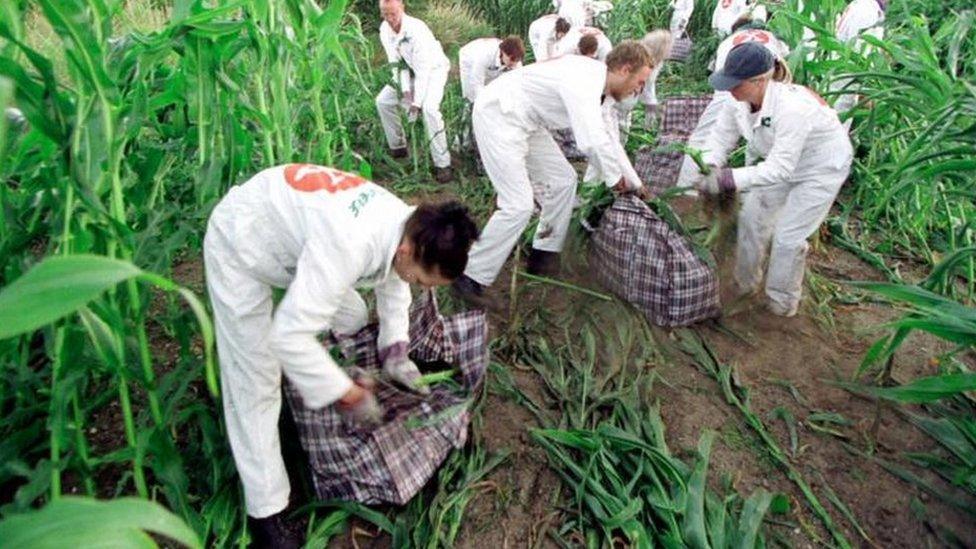
Greenpeace protesters destroy a field of GM crops at Lyng, Norfolk on 26 July 1999
Exactly 20 years ago, 28 Greenpeace activists were acquitted of criminal damage after destroying a field of genetically-modified (GM) maize on a farm in Norfolk. What led to this key moment in environmental protest?
In summer 1999, Michael Uwins was summoned to London by Greenpeace. The reason was on a "need to know" basis.
The group's East of England co-ordinator, he had been trained in non-violent "direct action" and knew something was about to happen.
What followed would make international headlines and result in a landmark legal verdict that gave a boost to environmental activism.
A trial crop of GM maize had been planted at Lyng, near Dereham, Norfolk, not far from Mr Uwins' home.
Greenpeace opposed such trials, claiming they would cause genetic pollution of the environment.
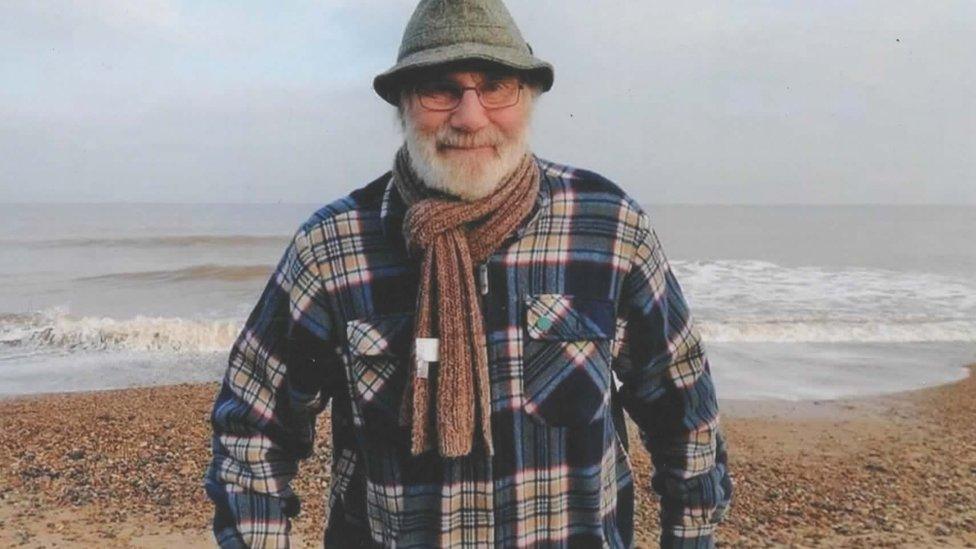
Now 74, Michael Uwins describes himself as an "armchair activist"
"We were told we had to 'destroy that crop' - because it was about to flower," said Mr Uwins, now 74.
"Before we made up our minds, we were given a percentage of the likelihood of arrest. It was 100%. That had never happened before."
So, at 05:00 BST on 26 July 1999, the protesters, including a vicar and a beauty consultant, stormed the six-acre (2.4 hectare) field of modified fodder maize, trampling and pulling at the 7ft (2.1m) plants.
Leading them, in white overalls, was Greenpeace executive director Lord Peter Melchett, a former government minister and himself a Norfolk farmer.
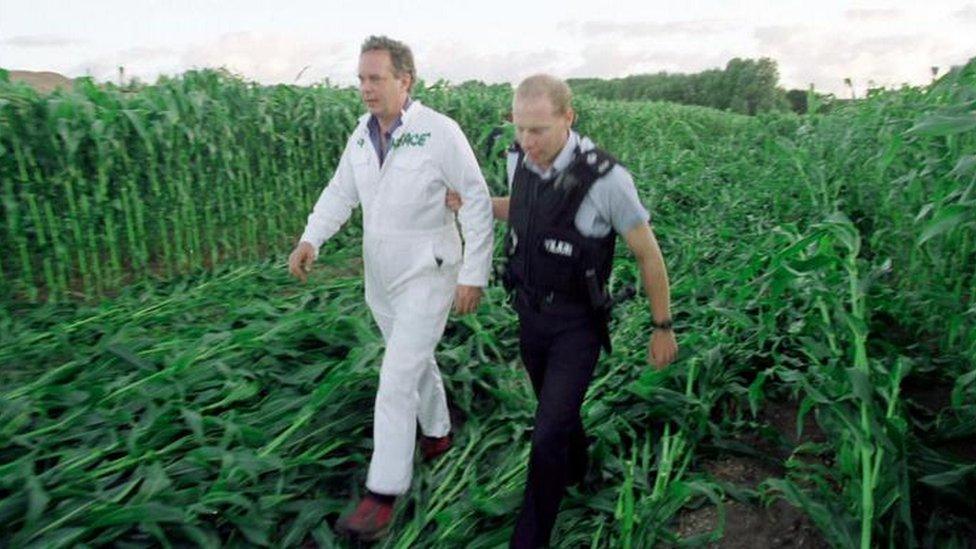
Lord Peter Melchett was arrested at the scene
The activists destroyed a large section of the crop with a machine armed with whirling 4ft (1.2m) blades.
They planned to bag it up and deliver it to Norfolk-based GM contractors AgrEvo.
"We totally believed in what we were doing," Mr Uwins said.
"We were not anti-science or GM as such; it was about open-air field trials. It was irresponsible and had to be stopped."
According to embedded Guardian journalist John Vidal, the activists were confronted by "furious" landowner William Brigham and family members.
"They were ramming and chasing the protesters around the field - it was all very dangerous," Mr Uwins said.
Mr Brigham declined to comment when contacted by the BBC this week.

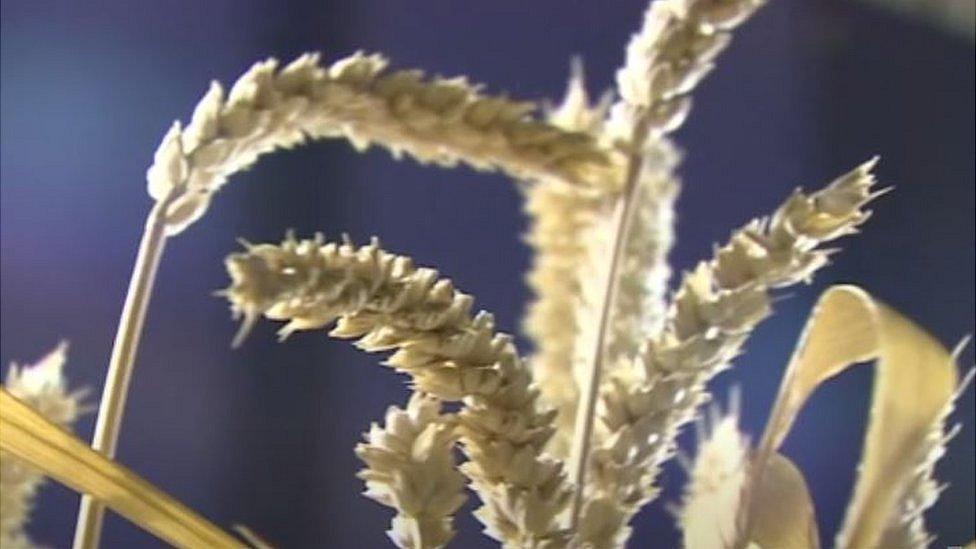
What are GM crops?
GM crops are produced when DNA is artificially transferred into plant cells, altering their genetics
Scientists say they are more resistant to disease, can be more nutritious and improve yields, helping to feed the world's burgeoning population
Controversy over GM crops was sparked in the UK in the early 1990s when tomato puree - made from the first US-approved GM crop - appeared in supermarkets
The backlash resulted in UK supermarkets stating their products were GM-free
In 2016, a report by leading scientists concluded GM food was safe to eat - but opponents maintain it could have far-reaching consequences, external
Prince Charles wrote to the-then Prime Minister Tony Blair in 1998 warning about the development of GM foods
GM crops are not grown commercially in the UK and the movement of GM food between countries is also controlled
Trials of GM crops continue but must have approval from the Department for Environment, Food and Rural Affairs, external (Defra)
Leading research institute the John Innes Centre, external says: "GM crops have been grown extensively around the world for 20 years and there have been no human health problems resulting from consumption of GM products."

The police arrived and, one by one, the protesters were arrested and charged with criminal damage and theft.
Mr Uwins recalls a "surreal moment" in custody. "A station sergeant came round taking a fish supper order: who wanted cod, and so on."
The activists argued they had lawful excuse for their actions, to prevent neighbouring land from being unlawfully invaded by genetically-modified pollen.
"We did what we did to prevent a crime", said Mr Uwins.
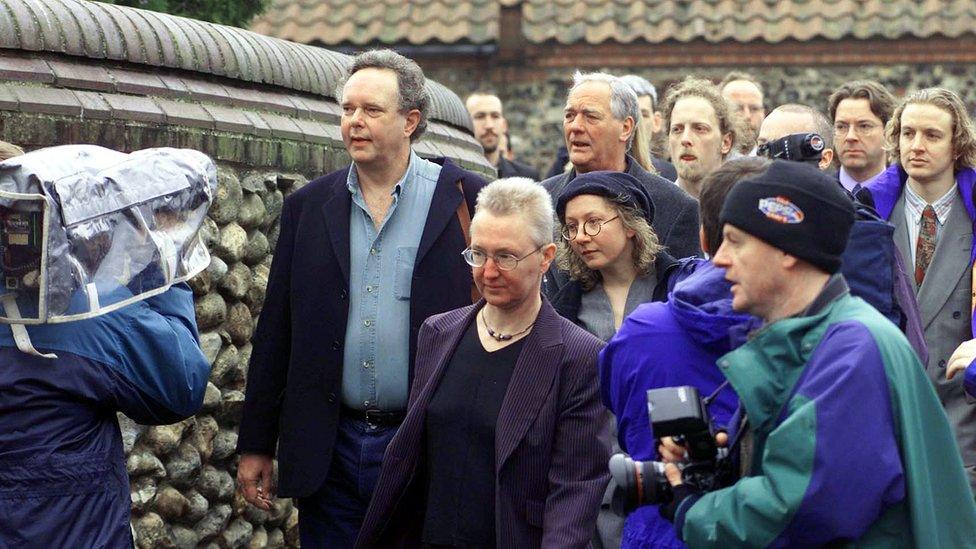
Lord Melchett leads Greenpeace protesters outside Norwich Crown Court during the trial in September 2000
At Norwich Crown Court they were found not guilty of theft in April 2000, but the jury could not decide on the criminal damage charge and was discharged.
A second trial began that autumn. It lasted two weeks, resulting in acquittal for all defendants on 20 September.
They had been confident of victory, but were still relieved, said Mr Uwins, who remembers jurors hugging them outside court.
"We felt triumphant. We felt we had achieved something and it was a message to the government that these field trials should not happen."
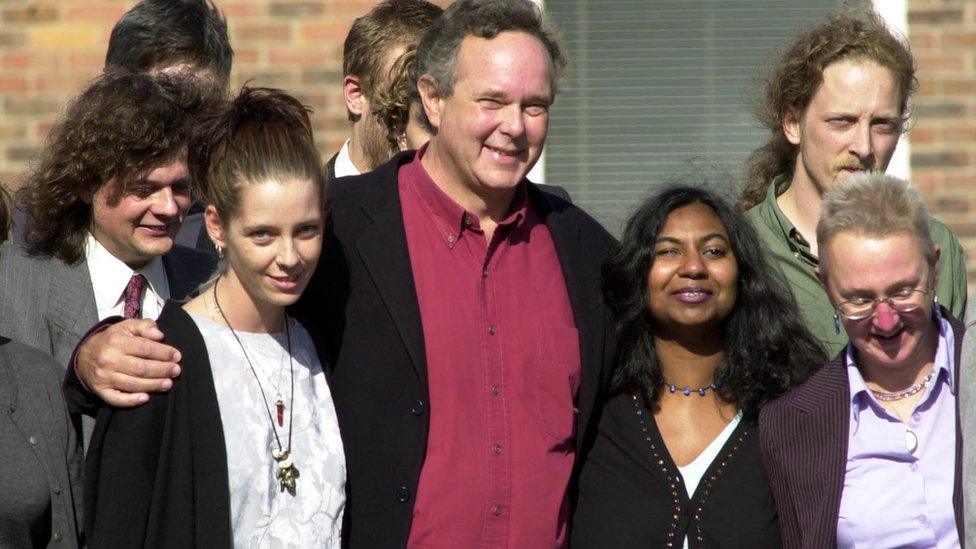
Lord Melchett (centre) outside Norwich Crown Court
Co-defendant Nicole Sanderson, then 29, said the case forced the GM industry to "sit up and take responsibility".
"When you take part in an environmental action - and I've taken part in hundreds - you are trying to stop something you believe to be wrong. You don't think about court and whether the 12 people of the jury agree with you," she said.
"Sometimes you are bringing the issue into the public eye, to right a wrong before it happens.
"The jury had to listen to some very complex science; it was a massive case. If they had misunderstood any of it at any point they could have ruled against us."
You might also like:
The National Farmers' Union (NFU), however, described the acquittal as "perverse".
"This gives the green light to wanton vandalism and trespass," it was reported as writing to then Home Secretary Jack Straw.
Twenty years on, the NFU said in a statement that "crop genetic improvement has been part of agriculture for hundreds of years" but that the European Union had been "discouraging in its approach to new food technologies".
It added: "Access to modern biotechnology would enable British farmers to use resources more efficiently, remain competitive in a global market and deliver even more high quality and nutritious food for the public."

Liz O'Neill, director of campaign group GM Freeze, said the protest's legacy had been a "safety-first approach" for food and farms
Another Norfolk farmer, David Hill, took part in a five-year cycle of GM crop trials, starting with sugar beet.
"I'd seen the bad varieties of weed beet in the 1960s and this was an opportunity, in one fell swoop, to grow a greener and cleaner crop of sugar beet. The environmental benefits were immense," he said.
"When I heard about the protest, I was bloody angry about it. We didn't fear them coming: we had very good security and we worked within official guidelines."
Greenpeace was delighted with the acquittal, but when contacted this week, declined to comment, saying it had not run campaigns on GM crops for several years.
However, Liz O'Neill, director of the GM Freeze campaign group, said: "These protests took place amid a headlong rush to release GMOs (genetically modified organisms) without proper testing, monitoring or the labelling that gives consumers a choice about what they are eating.
"They helped bring the issue to the attention of politicians, regulators and the media resulting in the safety-first approach that has protected our food and our farms ever since."
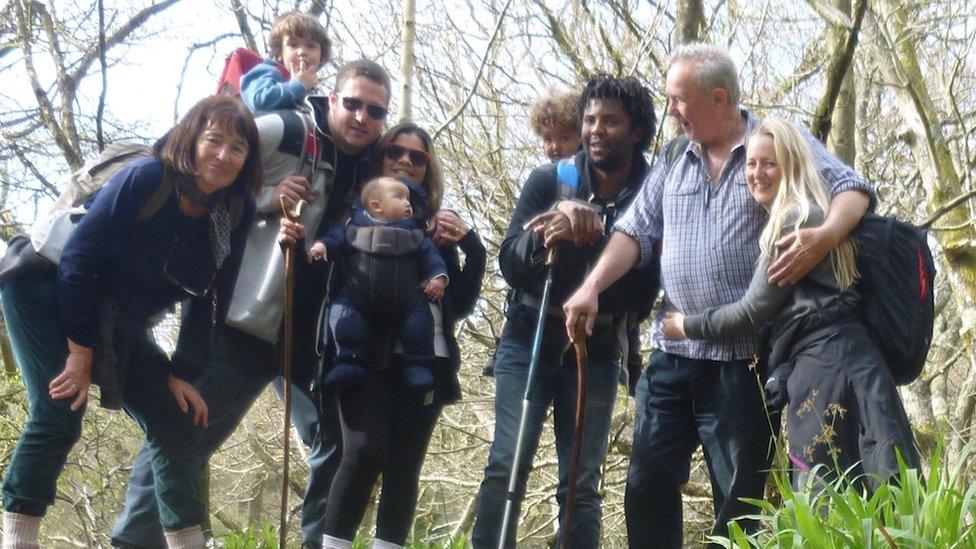
Jessie Mond Wedd, far right, hugging her father Lord Melchett, in a family photo taken in the Lake District in 2016
Lord Melchett died in August 2018. In 2000, he appeared on Desert Island Discs, telling Sue Lawley: "You only win a campaign if people support you and people will only support you if you're right - if what you're saying is correct or if what you predict turns out to be the case."
His daughter Jessie Mond Wedd, 39, said he was "a wonderful dad, committed to environmentalism".
She said: "He had a very individual way of looking at the world; he loved the outdoors and wildlife and felt a real sense of fear that it was in jeopardy"
"I often wonder what he would make of it all now, seeing the Extinction Rebellion movement enter mainstream consciousness."
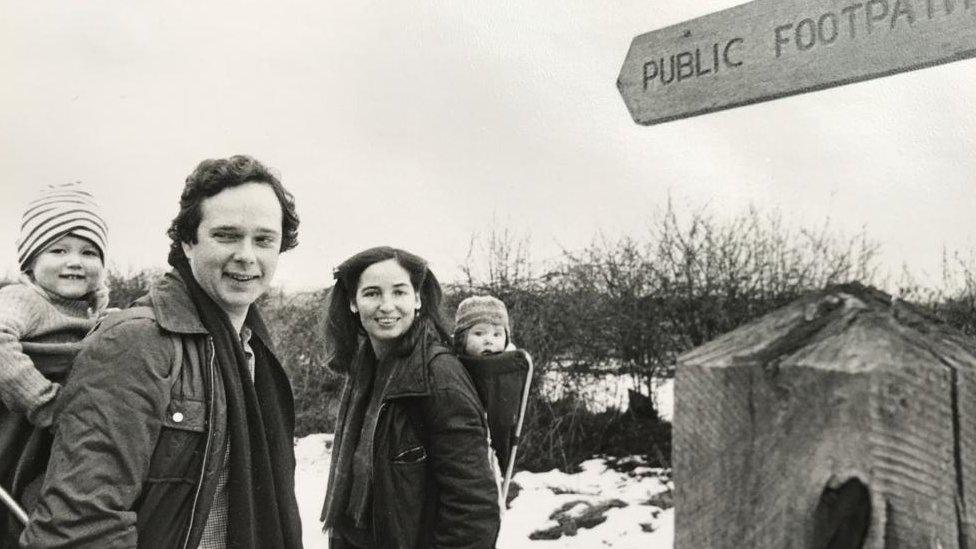
Jessie Mond Wedd on her father's back, with her brother Jay and mum Cass
The case inspired her to become a barrister, and she is now studying for a Masters in Environmental Law and Sustainable Development.
As for Mr Uwins, he has "absolutely no regrets" and feels "immensely proud" of his actions.
He now considers himself an "armchair activist", but said: "If the same thing happened again I would get my walking stick out of the cupboard and head straight up there."

Find BBC News: East of England on Facebook, external, Instagram, external and Twitter, external. If you have a story suggestion email eastofenglandnews@bbc.co.uk, external
- Published23 January 2019
- Published3 January 2019
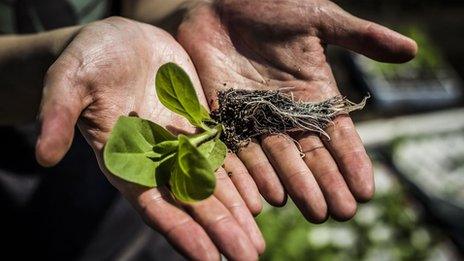
- Published31 August 2018
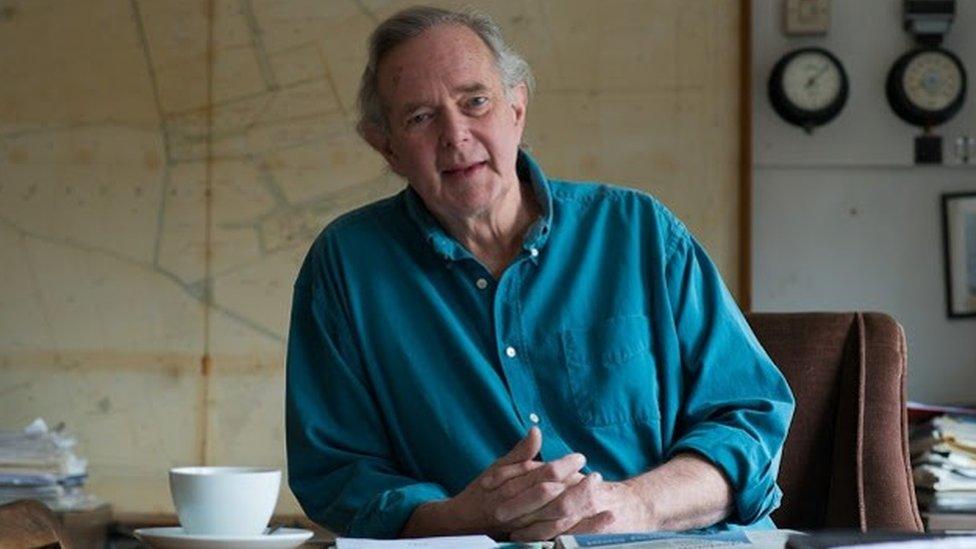
- Published18 May 2016
